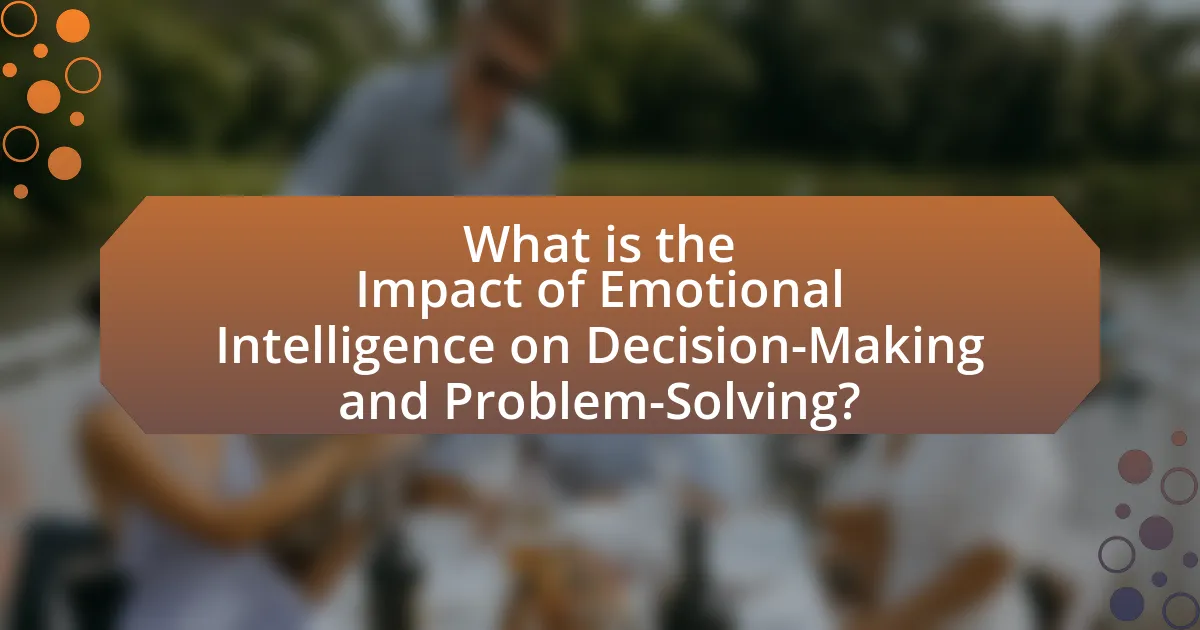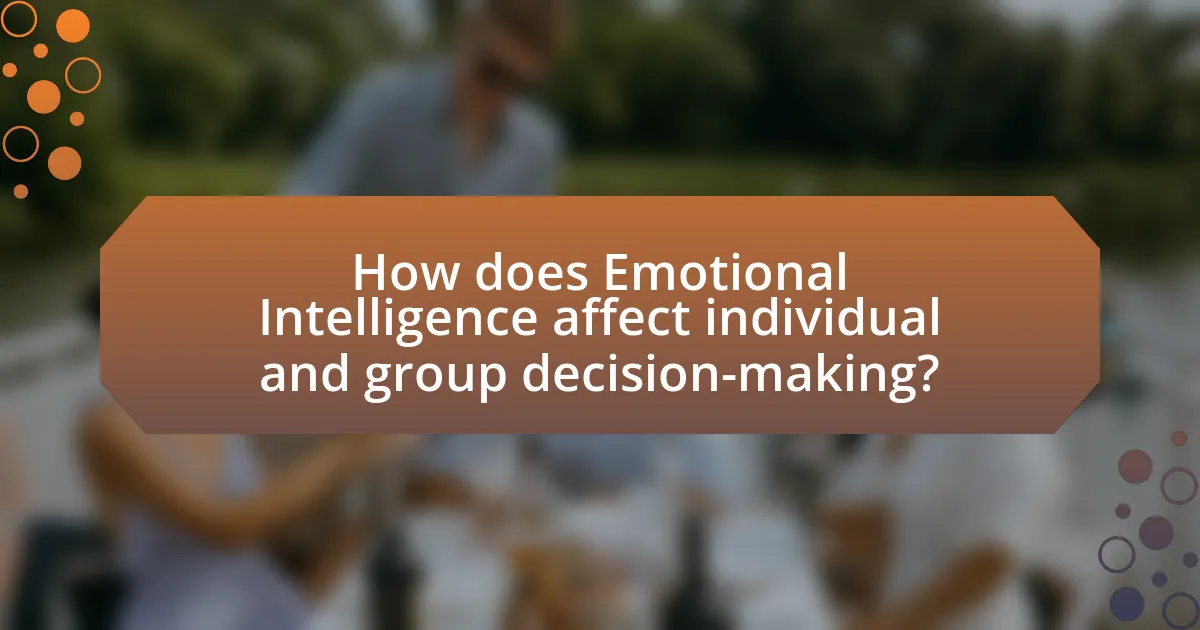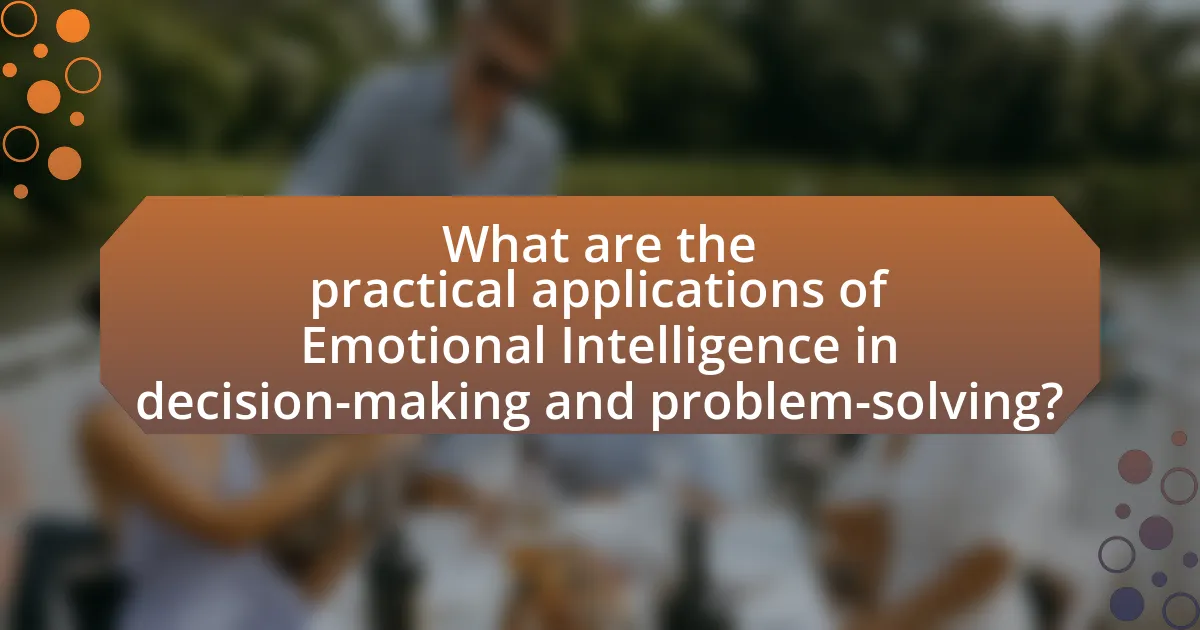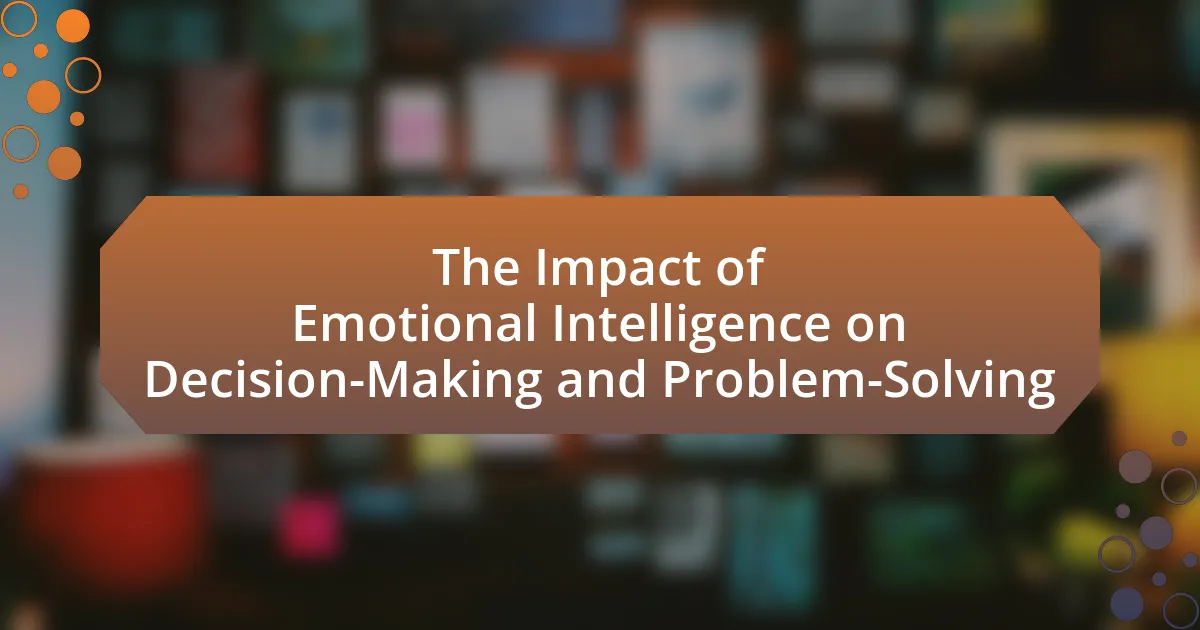Emotional Intelligence (EI) plays a crucial role in enhancing decision-making and problem-solving abilities by enabling individuals to recognize, understand, and manage their own emotions and those of others. The article explores how key components of EI, such as self-awareness, empathy, and emotional regulation, influence both individual and group decision-making processes. It highlights research findings that demonstrate the positive correlation between high EI and improved performance, creativity, and conflict resolution in collaborative environments. Additionally, the article discusses practical applications of EI in organizational settings and offers strategies for developing EI skills among employees to foster better outcomes in decision-making and problem-solving.

What is the Impact of Emotional Intelligence on Decision-Making and Problem-Solving?
Emotional intelligence significantly enhances decision-making and problem-solving by enabling individuals to recognize, understand, and manage their own emotions and the emotions of others. This heightened awareness allows for better assessment of situations, leading to more informed and effective choices. Research indicates that individuals with high emotional intelligence are more adept at navigating complex social dynamics, which is crucial in collaborative problem-solving environments. For instance, a study published in the Journal of Organizational Behavior found that teams with emotionally intelligent members demonstrated improved performance and creativity in problem-solving tasks, highlighting the direct correlation between emotional intelligence and effective decision-making outcomes.
How does Emotional Intelligence influence decision-making processes?
Emotional Intelligence (EI) significantly influences decision-making processes by enhancing self-awareness, empathy, and emotional regulation. Individuals with high EI can better understand their own emotions and those of others, leading to more informed and balanced decisions. Research indicates that leaders with high EI are more effective in decision-making, as they can navigate complex social dynamics and anticipate the emotional impact of their choices on team members. For instance, a study published in the Journal of Organizational Behavior found that leaders with higher EI scores made decisions that resulted in better team performance and satisfaction. This demonstrates that EI not only aids in personal decision-making but also positively affects group dynamics and outcomes.
What are the key components of Emotional Intelligence that affect decision-making?
The key components of Emotional Intelligence that affect decision-making are self-awareness, self-regulation, motivation, empathy, and social skills. Self-awareness allows individuals to recognize their emotions and understand how these emotions influence their decisions. Self-regulation enables individuals to manage their emotional responses, leading to more rational decision-making. Motivation drives individuals to pursue goals with energy and persistence, influencing the choices they make. Empathy helps individuals understand the emotions of others, which can guide collaborative decision-making. Lastly, social skills facilitate effective communication and relationship management, essential for making informed decisions in group settings. Research by Daniel Goleman highlights that these components significantly enhance decision-making quality by fostering better interpersonal relationships and emotional management.
How does self-awareness contribute to better decision-making?
Self-awareness significantly enhances decision-making by enabling individuals to recognize their emotions, biases, and thought processes. This recognition allows for more objective evaluations of situations, leading to informed choices. Research indicates that self-aware individuals are better at assessing risks and benefits, as they can identify how their feelings influence their judgments. For instance, a study published in the Journal of Personality and Social Psychology found that self-awareness correlates with improved problem-solving abilities, as individuals who understand their emotional triggers can manage them effectively, resulting in clearer, more rational decisions.
Why is Emotional Intelligence important in problem-solving?
Emotional Intelligence is important in problem-solving because it enhances an individual’s ability to understand and manage emotions, both their own and those of others. This understanding facilitates better communication, collaboration, and conflict resolution, which are critical components in addressing complex problems. Research indicates that teams with high emotional intelligence demonstrate improved performance and creativity in problem-solving scenarios, as they can navigate interpersonal dynamics effectively. For instance, a study published in the Journal of Organizational Behavior found that emotional intelligence significantly correlates with team effectiveness, leading to more innovative solutions and better decision-making outcomes.
How does Emotional Intelligence enhance creativity in problem-solving?
Emotional Intelligence enhances creativity in problem-solving by enabling individuals to recognize and manage their own emotions and the emotions of others, fostering an environment conducive to innovative thinking. This emotional awareness allows for better collaboration and communication, which are critical for brainstorming and generating diverse ideas. Research indicates that teams with high emotional intelligence demonstrate improved creativity, as they can navigate interpersonal dynamics effectively, leading to more open exchanges of ideas and constructive feedback. For instance, a study published in the Journal of Applied Psychology found that emotional intelligence positively correlates with creative problem-solving abilities, highlighting its role in enhancing team creativity and innovation.
What role does empathy play in resolving conflicts during problem-solving?
Empathy plays a crucial role in resolving conflicts during problem-solving by fostering understanding and collaboration among conflicting parties. When individuals demonstrate empathy, they are able to recognize and validate the emotions and perspectives of others, which can lead to more effective communication and a willingness to find common ground. Research indicates that empathetic engagement can reduce hostility and promote cooperative behavior, ultimately facilitating the resolution of disputes. For instance, a study published in the Journal of Conflict Resolution found that empathy significantly enhances negotiation outcomes by encouraging parties to consider each other’s interests, leading to mutually beneficial solutions.

How does Emotional Intelligence affect individual and group decision-making?
Emotional Intelligence significantly enhances both individual and group decision-making by enabling better self-awareness, empathy, and interpersonal skills. Individuals with high Emotional Intelligence can recognize their own emotions and those of others, leading to more informed and balanced decisions. For instance, a study published in the Journal of Organizational Behavior found that leaders with high Emotional Intelligence are more effective in decision-making processes, as they can navigate complex social dynamics and foster collaboration among team members. In group settings, Emotional Intelligence facilitates open communication and conflict resolution, which are crucial for reaching consensus and making collective decisions. Research by Mayer, Salovey, and Caruso (2004) indicates that teams with members who possess high Emotional Intelligence demonstrate improved problem-solving abilities and creativity, ultimately leading to better outcomes.
What are the differences in decision-making between emotionally intelligent and less emotionally intelligent individuals?
Emotionally intelligent individuals make decisions that are more balanced and informed, integrating both emotional and rational factors, while less emotionally intelligent individuals often rely predominantly on logic or impulsive feelings. Research indicates that emotionally intelligent individuals are better at recognizing their own emotions and those of others, which allows them to navigate complex social situations and make decisions that consider the emotional impact on themselves and others. For instance, a study published in the Journal of Organizational Behavior found that leaders with high emotional intelligence are more effective in decision-making, as they can empathize with team members and foster collaboration, leading to better outcomes. In contrast, individuals with lower emotional intelligence may struggle with understanding emotional cues, leading to decisions that can be overly reactive or disconnected from the emotional context, ultimately resulting in less effective problem-solving.
How does Emotional Intelligence impact risk assessment in decision-making?
Emotional Intelligence (EI) significantly enhances risk assessment in decision-making by enabling individuals to recognize, understand, and manage their own emotions and the emotions of others. This heightened awareness allows decision-makers to evaluate risks more comprehensively, as they can better anticipate emotional responses to potential outcomes, leading to more informed and balanced decisions. Research indicates that leaders with high EI are more adept at navigating complex situations, as they can integrate emotional data with analytical reasoning, ultimately improving the quality of their risk assessments. For instance, a study published in the Journal of Organizational Behavior found that teams led by emotionally intelligent leaders demonstrated better performance in risk-related tasks, highlighting the correlation between EI and effective decision-making under uncertainty.
What are the effects of Emotional Intelligence on group dynamics during decision-making?
Emotional Intelligence significantly enhances group dynamics during decision-making by fostering better communication, collaboration, and conflict resolution among team members. High Emotional Intelligence allows individuals to recognize and manage their own emotions and those of others, leading to a more cohesive group environment. Research indicates that teams with members who possess high Emotional Intelligence demonstrate improved problem-solving abilities and make more effective decisions, as they are better equipped to navigate interpersonal relationships and understand diverse perspectives. For instance, a study published in the Journal of Organizational Behavior found that teams with higher Emotional Intelligence scores achieved better outcomes in collaborative tasks, highlighting the positive correlation between Emotional Intelligence and group effectiveness in decision-making contexts.
How can Emotional Intelligence improve collaborative problem-solving?
Emotional Intelligence (EI) enhances collaborative problem-solving by fostering better communication and understanding among team members. High EI individuals can recognize and manage their own emotions while empathizing with others, leading to a more open and constructive dialogue. Research indicates that teams with higher EI demonstrate improved conflict resolution skills, as members are more adept at navigating emotional dynamics and maintaining a positive atmosphere. For instance, a study published in the Journal of Organizational Behavior found that teams with high EI were 20% more effective in problem-solving tasks compared to those with lower EI, highlighting the tangible benefits of emotional awareness in collaborative settings.
What strategies can teams use to leverage Emotional Intelligence for better outcomes?
Teams can leverage Emotional Intelligence (EI) for better outcomes by implementing strategies such as fostering open communication, promoting empathy, and encouraging collaborative problem-solving. Open communication allows team members to express their feelings and concerns, which enhances trust and reduces misunderstandings. Promoting empathy enables team members to understand and relate to each other’s emotions, leading to stronger interpersonal relationships and improved teamwork. Encouraging collaborative problem-solving involves utilizing diverse perspectives to address challenges, which can result in more innovative solutions. Research indicates that teams with high EI demonstrate better performance, as they are more adept at managing conflicts and adapting to change, ultimately leading to improved decision-making and problem-solving outcomes.
How does Emotional Intelligence facilitate communication in group problem-solving?
Emotional Intelligence facilitates communication in group problem-solving by enhancing interpersonal relationships and fostering an environment of trust and collaboration. Individuals with high Emotional Intelligence can recognize and manage their own emotions, as well as empathize with others, which leads to clearer expression of ideas and feelings. This emotional awareness reduces misunderstandings and conflicts, allowing group members to engage in constructive dialogue. Research indicates that teams with higher Emotional Intelligence demonstrate improved communication effectiveness, as evidenced by a study published in the Journal of Organizational Behavior, which found that teams with emotionally intelligent members achieved better problem-solving outcomes due to their ability to navigate emotional dynamics effectively.

What are the practical applications of Emotional Intelligence in decision-making and problem-solving?
Emotional Intelligence (EI) enhances decision-making and problem-solving by enabling individuals to recognize, understand, and manage their own emotions and the emotions of others. This capability allows for improved communication, collaboration, and conflict resolution in team settings. For instance, leaders with high EI can navigate complex interpersonal dynamics, fostering a positive work environment that encourages innovative solutions. Research indicates that teams with emotionally intelligent members are more effective in problem-solving, as they can empathize with diverse perspectives and integrate them into their decision-making processes. A study published in the Journal of Organizational Behavior found that EI significantly correlates with better team performance and decision quality, demonstrating its practical application in organizational contexts.
How can individuals develop their Emotional Intelligence for better decision-making?
Individuals can develop their Emotional Intelligence (EI) for better decision-making by engaging in self-awareness practices, enhancing empathy, and improving emotional regulation. Self-awareness involves recognizing one’s emotions and understanding how they influence thoughts and behaviors, which can be cultivated through mindfulness techniques and reflective journaling. Enhancing empathy requires actively listening to others and considering their perspectives, which can be practiced through social interactions and feedback. Improving emotional regulation involves learning to manage and respond to emotions constructively, which can be achieved through stress management strategies and cognitive-behavioral techniques. Research indicates that higher EI correlates with better decision-making outcomes, as individuals with developed EI are more adept at navigating complex emotional landscapes and making informed choices.
What techniques can enhance self-regulation in decision-making?
Techniques that can enhance self-regulation in decision-making include mindfulness practices, cognitive restructuring, and goal-setting strategies. Mindfulness practices, such as meditation, help individuals become aware of their thoughts and emotions, allowing for better control over impulsive reactions. Cognitive restructuring involves identifying and challenging negative thought patterns, which can lead to more rational decision-making. Goal-setting strategies provide clear objectives, enabling individuals to focus their efforts and maintain motivation, thereby improving self-regulation. Research indicates that these techniques can significantly improve emotional regulation and decision-making outcomes, as evidenced by studies showing that mindfulness can reduce stress and enhance focus, while effective goal-setting has been linked to increased performance and achievement.
How can mindfulness practices improve Emotional Intelligence skills?
Mindfulness practices can enhance Emotional Intelligence skills by fostering greater self-awareness and emotional regulation. Engaging in mindfulness techniques, such as meditation and focused breathing, allows individuals to observe their thoughts and feelings without judgment, leading to improved recognition of their emotional states. Research indicates that mindfulness training can significantly increase emotional awareness, as evidenced by a study published in the journal “Emotion” by Keng, Smoski, and Robins, which found that participants who practiced mindfulness reported higher levels of emotional clarity and regulation. This heightened awareness enables individuals to respond to emotional stimuli more effectively, thereby improving their interpersonal relationships and decision-making abilities.
What best practices can organizations implement to foster Emotional Intelligence in teams?
Organizations can implement several best practices to foster Emotional Intelligence in teams, including providing training programs focused on emotional awareness, communication skills, and empathy. Research indicates that training can enhance team members’ ability to recognize and manage their emotions, leading to improved collaboration and decision-making. Additionally, creating a culture that encourages open feedback and active listening promotes emotional understanding among team members. According to a study published in the Journal of Organizational Behavior, teams with high emotional intelligence demonstrate better problem-solving capabilities and higher overall performance. Regular team-building activities that emphasize emotional connection can further strengthen interpersonal relationships and enhance team dynamics.
How can training programs be designed to enhance Emotional Intelligence among employees?
Training programs can be designed to enhance Emotional Intelligence among employees by incorporating experiential learning, self-assessment tools, and role-playing exercises. Experiential learning allows employees to engage in real-life scenarios that require emotional awareness and regulation, fostering practical application of Emotional Intelligence skills. Self-assessment tools, such as emotional intelligence assessments, help employees identify their strengths and areas for improvement, creating a personalized development plan. Role-playing exercises simulate workplace situations, enabling employees to practice empathy, active listening, and conflict resolution in a controlled environment. Research indicates that organizations implementing such targeted training see a significant increase in employee engagement and collaboration, which are critical components of effective decision-making and problem-solving.
What role does leadership play in promoting Emotional Intelligence within an organization?
Leadership plays a crucial role in promoting Emotional Intelligence (EI) within an organization by modeling EI behaviors and creating a culture that values emotional awareness. Leaders who demonstrate high levels of emotional intelligence, such as empathy and self-regulation, set a standard for their teams, encouraging employees to develop similar skills. Research indicates that organizations with emotionally intelligent leaders experience improved team collaboration and communication, which enhances overall decision-making and problem-solving capabilities. For instance, a study published in the Journal of Organizational Behavior found that leaders who exhibit emotional intelligence positively influence their team’s performance and job satisfaction, leading to better organizational outcomes.
